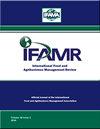Social capital in transactions: The role of economic and social trust in the specialty beef production system in Brazil
IF 1.5
4区 经济学
Q3 AGRICULTURAL ECONOMICS & POLICY
International Food and Agribusiness Management Review
Pub Date : 2024-05-10
DOI:10.22434/ifamr2022.0049
引用次数: 0
Abstract
This study aims to understand the social capital inherent in agents and the role of social and economic trust in transactions between beef cattle producers and slaughtering cooperatives in the specialty beef production system in Paraná state, Brazil. This qualitative research involved 31 semi-structured interviews with beef cattle producers, cooperatives, and key agents. Results revealed that social capital, comprising networks and informal norms, favors the condition of trust, enabling the construction of a hybrid governance structure under a complex institutional environment. Social and economic trust between agents facilitates transactions, reduces behavioral and market uncertainties, enables ex-post adaptations, and consequently, reduces monitoring costs and transaction costs. Trust based on social aspects, i.e., social trust, was more relevant for the construction of arrangements, while trust based on economic aspects, i.e., economic trust, had a greater impact on the continuity of arrangements. This reveals that looking at only one of them is not enough to understand contractual arrangements. Thus, this study highlights that unfolding the concept of trust and investigating whether it comes from an economic or social basis is important to understand the complexity of such arrangements, which may influence specialty beef production system design and coordination efficiency.交易中的社会资本:经济和社会信任在巴西特种牛肉生产系统中的作用
本研究旨在了解代理商固有的社会资本,以及社会和经济信任在巴西巴拉那州特种牛肉生产系统中肉牛生产商和屠宰合作社之间交易中的作用。这项定性研究对肉牛生产者、合作社和主要代理人进行了 31 次半结构式访谈。研究结果表明,由网络和非正式规范组成的社会资本有利于建立信任,从而能够在复杂的制度环境下构建混合治理结构。代理人之间的社会和经济信任促进了交易,减少了行为和市场的不确定性,使事后调整成为可能,从而降低了监督成本和交易成本。基于社会方面的信任(即社会信任)与安排的构建更为相关,而基于经济方面的信任(即经济信任)对安排的连续性影响更大。这表明,只看其中一个因素不足以理解契约安排。因此,本研究强调,展开信任的概念并研究它是来自经济基础还是社会基础,对于理解此类安排的复杂性非常重要,这可能会影响特种牛肉生产系统的设计和协调效率。
本文章由计算机程序翻译,如有差异,请以英文原文为准。
求助全文
约1分钟内获得全文
求助全文
来源期刊

International Food and Agribusiness Management Review
AGRICULTURAL ECONOMICS & POLICY-
CiteScore
2.90
自引率
0.00%
发文量
0
审稿时长
>12 weeks
期刊介绍:
The IFAMR is an internationally recognized catalyst for discussion and inquiry on issues related to the global food and agribusiness system. The journal provides an intellectual meeting place for industry executives, managers, scholars and practitioners interested in the effective management of agribusiness firms and organizations.
IFAMR publishes high quality, peer reviewed, scholarly articles on topics related to the practice of management in the food and agribusiness industry. The Journal provides managers, researchers and teachers a forum where they can publish and acquire research results, new ideas, applications of new knowledge, and discussions of issues important to the worldwide food and agribusiness system. The Review is published electronically on this website.
The core values of the Review are as follows: excellent academic contributions; fast, thorough, and detailed peer reviews; building human capital through the development of good writing skills in scholars and students; broad international representation among authors, editors, and reviewers; a showcase for IFAMA’s unique industry-scholar relationship, and a facilitator of international debate, networking, and research in agribusiness.
The Review welcomes scholarly articles on business, public policy, law and education pertaining to the global food system. Articles may be applied or theoretical, but must relevant to managers or management scholars studies, industry interviews, and book reviews are also welcome.
 求助内容:
求助内容: 应助结果提醒方式:
应助结果提醒方式:


